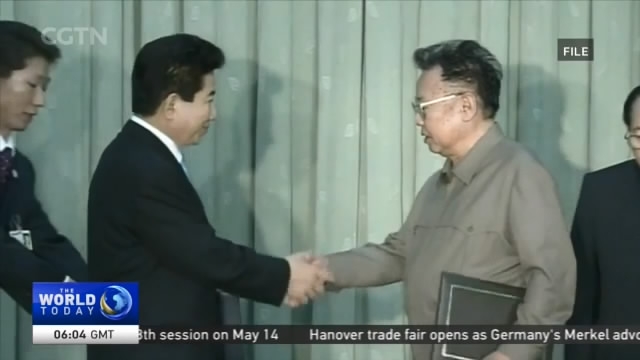
14:48, 23-Apr-2018
Korean Peninsula Diplomacy: A look at the highs and lows in ROK-DPRK relations
03:08

On Friday Kim Jong Un will become the first DPRK leader to set foot in South Korea when he meets with President Moon Jae-in to discuss a potential denuclearization deal. But it's not the first ever inter-Korean summit and it certainly won't be the first nuclear deal if an agreement is reached. CGTN's Jack Barton takes a look back at what went wrong in the past and why it just might work this time.
The finishing touches are being put on the summit center at the demilitarized zone where the leaders of the divided Korea plan to meet on Friday.
JACK BARTON DEMILITARIZED ZONE "It won't be the first ever inter-Korean summit. There were two in the past involving Kim Jong Un's father Kim Jong Il. They are remembered well here in South Korea as having failed despite high expectations."
The failure was not in the ability to reach an agreement, but for the DPRK to implement what was agreed and the agreements stretched back even before the summits or 2000 and 2007.
DANIEL PINKSTON LECTURER IN INT'L RELATIONS, TROY UNIV. "In the 1994 agreed framework they agreed to abandon their nuclear facilities or capabilities, the statement of principles in 2005 under the Six-Party Talks frame work and even as far back as 1992 there was a joint declaration on the denuclearization of the Korean Peninsula that the two Koreas signed they agreed not to pursue nuclear weapons or reprocessing capabilities or uranium enrichment and so forth."
Those agreements and financial aid were followed by more missile and then nuclear bomb tests.
LEE SANG-HYUN DIRECTOR, SEJONG INSTITUTE "What was the mistake of the past? We negotiated every step of the way as requested by North Korea, and North Korea repeatedly gained rewards while stalling for time while upgrading its nuclear weapons program."
It explains why many South Koreans are now wary about Moon pledging financial aid in return for a promise from Pyongyang to abandon its nuclear weapons program.
YEO YOUNG-JU SOUTH KOREAN RESIDENT "North Korea looked as if it would denuclearise during the two previous summits, but they were back to square one. We should not blindly believe or feel easy. We need to thoroughly verify if they really get rid of their nuclear materials, and then give out economic benefits accordingly."
This time though the stakes are much higher. The U.S. has put the option of a pre-emptive military strike firmly on the table and the DPRK is unquestionably reeling from tough economic sanctions. U.S. military action is something that neither Seoul nor Pyongyang wants. And given that Moon is unable to promise too much due to those tough U.N. sanctions it has raised hopes that if anything is agreed to on Friday it might be at least partially implemented. Jack Barton, CGTN at the Demilitarized Zone.

SITEMAP
Copyright © 2018 CGTN. Beijing ICP prepared NO.16065310-3
Copyright © 2018 CGTN. Beijing ICP prepared NO.16065310-3